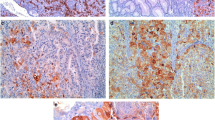Abstract
B7-H6, a novel member of the B7 family which binds to NKp30 to trigger antitumor NK cell cytotoxicity and cytokine secretion. Recently, B7-H family has been reported to be a negative regulator of the immune response in patients with gastric carcinoma. However, no reports have investigated the clinical significance of B7-H6 expression in human gastric cancer. We present the first study to the clinicopathological and prognostic value of B7-H6 in primary gastric tumors and adjacent non-tumor tissues at the protein level. Here we show that B7-H6 immunoreactivity was expressed in 6/60 (10 %) gastric tumors and 8/43 (18.60 %) adjacent non-tumor tissues. No statistical difference was found between B7-H6 expression and various prognostic factors; however, B7-H6-positive carcinomas were significantly associated with a higher differentiation (p = 0.047). The survival analysis did not confirm the prognostic significance of B7-H6 expression in gastric cancer patients. Our data suggest that B7-H6, as detected by immunohistochemistry, is of limited value as a prognostic marker for gastric cancer.


Similar content being viewed by others
References
Jemal A, Bray F, Center MM, Ferlay J, Ward E, Forman D (2011) Global cancer statistics. CA Cancer Clin 61:69–90. doi:10.3322/caac
Zang X, Allison JP (2007) The B7 family and cancer therapy. Costimulation and coinhibition. Clin Cancer Res 13:5271–5279
Greaves P, Gribben JG (2013) The role of B7 family molecules in hematologic malignancy. Blood 121:734–744. doi:10.1182/blood-2012-10-385591
Lu B, Chen L, Liu L, Zhu Y, Wu C, Jiang J, Zhang X (2011) T-cell-mediated tumor immune surveillance and expression of B7 co-inhibitory molecules in cancers of the upper gastrointestinal tract. Immunol Res 50:269–275. doi:10.1007/s12026-011-8227-9
Capece D, Verzella D, Fischietti M, Zazzeroni F, Alesse E (2012) Targeting costimulatory molecules toimprove antitumor immunity. J Biomed Biotechnol 2012:926321. doi:10.1155/2012/926321
Seliger B, Quandt D (2012) The expression, function, and clinical relevance of B7 family members in cancer. Cancer Immunol Immunother 61:1327–1341. doi:10.1007/s00262-012-1293-6
Brandt CS, Baratin M, Yi EC, Kennedy J, Gao Z, Fox B, Haldeman B, Ostrander CD, Kaifu T, Chabannon C, Moretta A, West R, Xu W, Vivier E, Levin SD (2009) The B7 family member B7-H6 is a tumor cell ligand for the activating natural killer cell receptor NKp30 in humans. J Exp Med 206:1495–1503. doi:10.1084/jem.20090681
Edge SB, Byrd DR, Compton CC, Fritz AG, Greene FL, Trotti A (2009) AJCC cancer staging manual, 7th edn. Springer-verlag, New York
Wu C, Zhu Y, Jiang J, Zhao J, Zhang XG, Xu N (2006) Immunohistochemical localization of programmed death-1 ligand-1 (PD-L1) in gastric carcinoma and its clinical significance. Acta Histochem 108:19–24
Liu SM, Meng Q, Zhang QX (2008) Expression and significance of B7-H1 and its receptor PD-1 in human gastric carcinoma. Zhonghua Zhong Liu Za Zhi 30:192–195
Sun J, Xu K, Wu C, Wang Y, Hu Y, Zhu Y, Chen Y, Shi Q, Yu G, Zhang X (2007) PD-L1 expression analysis in gastric carcinoma tissue and blocking of tumor-associated PD-L1 signaling by two functional monoclonal antibodies. Tissue Antigens 69:19–27
Wu CP, Jiang JT, Tan M, Zhu YB, Ji M, Xu KF, Zhao JM, Zhang GB, Zhang XG (2006) Relationship between co-stimulatory molecule B7-H3 expression and gastric carcinoma histology and prognosis. World J Gastroenterol 12:457–459
Arigami T, Uenosono Y, Hirata M, Yanagita S, Ishigami S, Natsugoe S (2011) B7-H3 expression in gastric cancer: a novel molecular blood marker for detecting circulating tumor cells. Cancer Sci 102:1019–1024. doi:10.1111/j.1349-7006.2011.01877.x
Arigami T, Uenosono Y, Ishigami S, Hagihara T, Haraguchi N, Natsugoe S (2011) Clinical significance of the B7-H4 coregulatory moleculeas a novel prognostic marker in gastric cancer. World J Surg 35:2051–2057. doi:10.1007/s00268-011-1186-4
Jiang J, Zhu Y, Wu C, Shen Y, Wei W, Chen L, Zheng X, Sun J, Lu B, Zhang X (2010) Tumor expression of B7-H4 predicts poor survival of patients suffering from gastric cancer. Cancer Immunol Immunother 59:1707–1714
Acknowledgments
The authors thank the patients who took part in this study. Work was supported by the National Natural Science Foundation of China (No. 30872943).
Conflict of interest
All the authors declare no conflict of interest.
Author information
Authors and Affiliations
Corresponding author
Rights and permissions
About this article
Cite this article
Chen, XJ., Shen, J., Zhang, GB. et al. B7-H6 Protein Expression has no Prognostic Significance in Human Gastric Carcinoma. Pathol. Oncol. Res. 20, 203–207 (2014). https://doi.org/10.1007/s12253-013-9686-1
Received:
Accepted:
Published:
Issue Date:
DOI: https://doi.org/10.1007/s12253-013-9686-1




